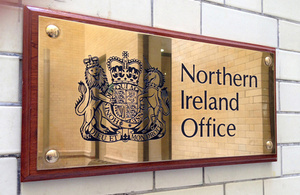UK Government funding available for Northern Ireland
News story
UK Government funding available for Northern Ireland

The UK government is committed to supporting communities across Northern Ireland to ensure that no community is left behind and to seek to build a more prospectus and stable future as we recover from the Covid-19 pandemic.
A number of new funds were announced at Budget to help build local economic growth and strengthen communities across the whole of the United Kingdom (including Northern Ireland, Wales, and Scotland). Each of these funds has been designed to account for Northern Ireland’s unique place within the United Kingdom.
Funds open for bids now
Levelling Up fund
| Levelling Up Fund |
|---|
| £4.8 billion investment across the UK in infrastructure and capital programmes that improves everyday life, including regenerating town centres and high streets, upgrading local transport, and investing in cultural and heritage assets up to 2024-2025. |
| Bids requiring less than £20 million of funding welcome from businesses, voluntary and community sector organisations, district councils, the Northern Ireland Executive and other public sector bodies as part of a competitive process. |
| Capital-only fund: no limit to the number of bids that an organisation can submit, with at least £800 million made available across Northern Ireland Wales and Scotland over four years from 2021-2022 to 2024-2025. |
| Application deadline is midday Friday 18 June 2021. Note: Bidders who are not local authorities will need to demonstrate they have the capacity and capability to deliver capital projects. |
| Application form here. |
| More info here. |
| UK Community Renewal Fund |
|---|
| £220 million investment across the UK in skills, community and place, local business, and supporting people into employment. |
| Bids welcome from a range of local applicants including but not limited to: business, voluntary and community sector organisations, universities, colleges, district councils and other public sector bodies. |
| 90% revenue fund: no limit to the number of bids that an organisation can submit, up to the total value of the Northern Ireland allocation of £11 million. |
| Application deadline is midday Friday 18 June 2021. |
| Application form here. |
| More info here. |
Funds launching soon
UK Shared Prosperity Fund
PEACE PLUS
| Community Ownership Fund |
|---|
| A new £150 million fund to help ensure that communities can support and continue |
| benefiting from the local facilities, community assets and amenities most important to them. |
| From summer 2021, community groups will be able to bid for up to £250,000 matched-funding to help |
| buy or take over local community assets at risk of being lost. |
| Projects could include community- |
| owned sports clubs, sporting and leisure facilities, cinemas and theatres, music venues, museums, galleries, parks, pubs and shops. |
| Full bidding prospectus to be published at the end of June 2021. |
| More info here. |
| UK Shared Prosperity Fund |
|---|
| Replacing EU structural funding (e.g., European Regional Development Fund and the European Social Fund) with a fund that is better tailored to the UK economy and helps to level up and create opportunity across the UK for people and places. |
| Will target places most in need, including ex-industrial areas, deprived towns and rural and coastal communities. |
| A portion of the Fund will target places most in need across the UK, prioritising investment in people, investment in communities and place and investment for local business. A second portion of the Fund will be targeted differently to people most in need through bespoke employment and skills programmes that are tailored to local need. |
| Funding will ramp up following the launch of the fund in 2022 so that total domestic UK-wide funding will at least match EU receipts reaching around £1.5bn a year. |
| More info here. |
| PEACE PLUS |
|---|
| PEACE PLUS is the new EU cross-border programme that will contribute to a more prosperous and stable society in Northern Ireland and the Border Region of Ireland. It will build upon previous PEACE and INTERREG Programmes. |
| The programme will fund activities that promote peace and reconciliation and contribute to the cross-border economic and territorial development of the region. |
| The UK is the majority contributor, committing to providing over £500m to PEACE PLUS between now and 2027. |
| PEACE PLUS is the biggest PEACE programme yet bringing the total budget to approximately €1bn. |
| More info here. |
Published 3 June 2021
